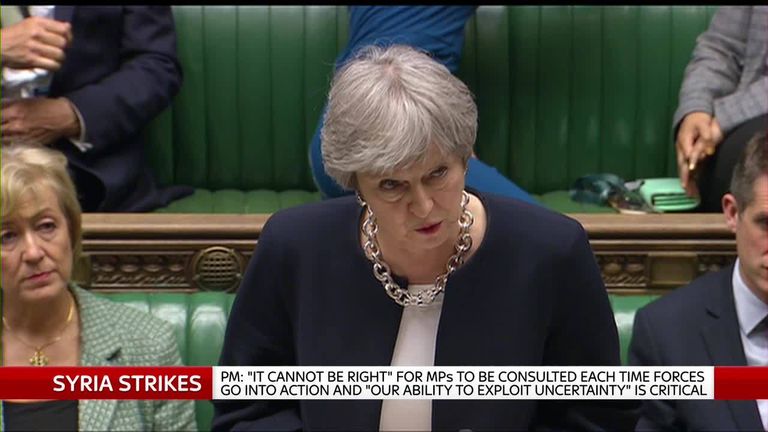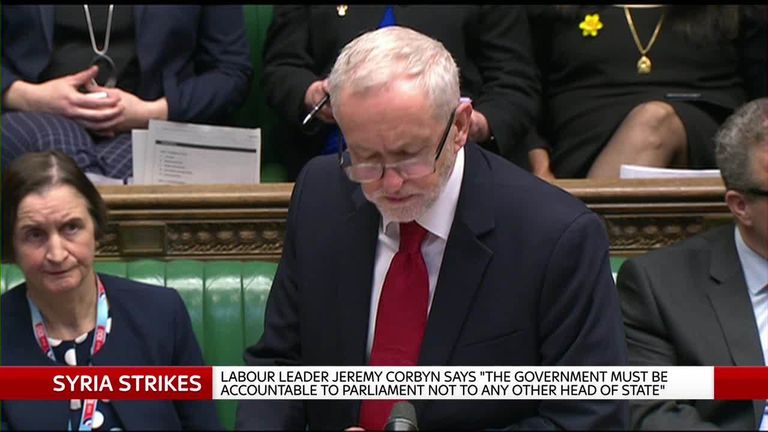May accused of 'flagrant disregard' for Parliament over Syria strikes
The PM defends her decision not to get MPs' approval before acting, as Jeremy Corbyn renews his call for a War Powers Act.
Tuesday 17 April 2018 17:32, UK
Theresa May has been accused of displaying a "flagrant disregard" for Parliament over the Syria airstrikes during a second day of debate sparked by Britain's role in the military action.
The Prime Minister defended her decision not to get the approval of MPs before joining the US and France in targeting Bashar al Assad's chemical weapons facilities at the weekend.
Mrs May said doing so would have compromised the "effectiveness of our operations and safety of British servicemen and women".
Jeremy Corbyn, who has called for a War Powers Act requiring Parliament's backing for future military action, said Mrs May had "tossed aside" the convention that prime ministers seek the support of the Commons before committing forces to combat because it was "inconvenient".
:: Analysis: 'Unforeseen risks in no longer consulting Parliament
The Labour leader said Mrs May's predecessor David Cameron had come to Parliament a number of times to seek the authority for military action.
"I am sorry to say the Prime Minister's decision not to recall Parliament and engage in further military action in Syria last week showed a flagrant disregard for this convention," he said.
Mrs May hit out at her opposite number's call for a War Powers Act, claiming it would "seriously compromise" national security, national interests and the lives of British citizens at home and abroad.
She said such legislation would make smaller-scale and targeted military action like that in Syria "unviable".
The PM told the Commons: "Making it unlawful for Her Majesty's Government to undertake any such military intervention without a vote would seriously compromise our national security, our national interests, and the lives of British citizens at home and abroad."
"And for as long as I'm Prime Minister, that will never be allowed to happen."
:: May denies launching strikes on Trump's orders
Concluding her speech, Mrs May claimed a "clear majority" of MPs believed the Government did the right thing.
"I realise that for some in this House, and especially for those who have not had to do what I have to, the attractive purity of a democratic principle that Parliament should always decide may still appeal more than the practice of how to ensure an effective military operation that delivers our national interest," she said.
Mrs May went on to say that she hoped MPs could agree on her "commitment as Prime Minister to being held to account by this House for the decisions that I've taken".
Conservative MP Johnny Mercer, a former soldier, said a War Powers Act would be an act of "calamitous insanity to bring down on our foreign policy".
But Mr Corbyn defended his proposal in the face of sustained Tory attacks, saying it could "specify at what point in decision-making processes MPs should be involved, as well as retaining the right of ministers to act in an emergency or the country's self-defence".
He said: "It is about democracy, it is about accountability, it is about making very serious decisions, that is what MPs are elected to do.
"It would bind this Government and future government to the basic democratic principle on the most serious and crucial issues of public policy that we're ever asked to take a decision on.
"All those that we here in 2003 during those debates on Iraq remember them very well and remember the questioning very well from the public about what they did and how they voted."
Mr Corbyn was backed by the Scottish National Party's Westminster leader Ian Blackford, who said the "time has come" for such a change.
He added: "A long-standing policy of the SNP, we believe it will stop situations as we saw last week where Parliament is completely bypassed in a reckless fashion."
:: At the end of the debate, MPs voted on the motion: "That this House has considered Parliament's rights in relation to the approval of military action by British forces overseas". They voted 317-256 in favour of it.
It represents a victory for the Government, which backed the motion, and a defeat for Mr Corbyn. The Labour leader asked his MPs to vote against the motion in order to "express our dissatisfaction with the Government's response and assert the rights of Parliament".
This was despite Corbyn introducing the motion in his name at the beginning of the three-hour debate.







